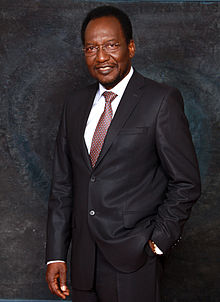Wikimedia Commons has media related to Dioncounda Traoré .
- 1 2 3 4 5 6 "Dioncounda Traoré : Une riche expérience" [ permanent dead link ], L'Essor, number 16,025, 4 September 2007 (in French).
- ↑ "Soumeylou Boubèye Maiga exclu de l’ADEMA", Panapress, 26 February 2007 (in French).
- 1 2 3 4 "Dioncounda Traoré, président de l'Assemblée : Un "para" à la tête de l'Hémicycle" Archived 13 August 2014 at the Wayback Machine , L'Independant, 6 September 2007 (in French).
- ↑ "Membres du conseil exécutif de l'Adéma-PASJ élus au congrès constitutif du 25 et 26 Mai 1991" Archived 14 May 2014 at the Wayback Machine , ADEMA website (in French).
- ↑ "Membres du conseil exécutif de l'Adéma-PASJ élus au premier congrès ordinaire de Septembre 1994" Archived 13 September 2014 at the Wayback Machine , ADEMA website (in French).
- ↑ "L'agenda du premier quinquennat 1992–1997" [ permanent dead link ], L'Essor, 6 June 2002 (in French).
- ↑ "Liste en ballotage pour le deuxiéme tour" Archived 27 September 2007 at the Wayback Machine , L'Essor, 20 July 2007 (in French).
- ↑ "Liste provisoire des députés élus au 2è tour" [ permanent dead link ], L'Essor, number 15,998, 26 July 2007 (in French).
- ↑ "Dioncounda Traoré élu président de l'Assemblée nationale : Presque un plébiscite !" Archived 27 September 2007 at the Wayback Machine , L'Essor, number 16,026, 4 September 2007 (in French).
- ↑ "Mali: Dioncounda Traoré élu président de l'Assemblée nationale" Archived 30 September 2007 at the Wayback Machine , AFP, 3 September 2007 (in French).
- ↑ "Mali junta says power transfer 'within days'". Al Jazeera. 7 April 2012. Retrieved 9 April 2012.
- ↑ "Parliament head returns to Mali as interim president". USA Today. Associated Press. 7 April 2012. Retrieved 9 April 2012.
- ↑ "Mali's new leader threatens 'total war' against Tuareg rebels". The Telegraph. 13 April 2012. Retrieved 14 April 2012.
- ↑ "Mali's Traore 're-appoints' prime minister". Al Jazeera. 13 August 2012. Archived from the original on 16 August 2012. Retrieved 15 August 2012.
- ↑ Tiemoko Diallo and Adama Diarra, "Mali's new president promises to bring peace, fight graft", Reuters, 4 September 2013.
- 1 2 "Mali President Dioncounda Traore 'in hospital after attack'". BBC News. 21 May 2012. Retrieved 20 May 2012.
- ↑ D Turf, Mali's transitional president beaten up by demonstrators Archived 25 January 2013 at archive.today , Ground Report, 23 May 2012
- 1 2 "Exclusif - Mali : la vidéo du lynchage de Dioncounda Traoré au palais de Koulouba". Jeune Afrique (in French). 29 June 2012. Retrieved 29 June 2012.
- ↑ "Vidéo de l'agression du président malien". Le Figaro (in French). 29 June 2012. Retrieved 29 June 2012.
- ↑ "Interim president of Mali injured, witness says". Associated Press. 21 May 2012. Retrieved 21 May 2012.
- ↑ "Mali interim president injured in attack". Al Jazeera. 22 May 2012. Retrieved 22 May 2012.
- ↑ Adama Diarra and David Lewis (23 May 2012). "Mali leader to head to France for health checks-sources". Reuters. Retrieved 24 May 2012.
- ↑ "Mali's President Dioncounda Traore returns from Paris". BBC News. 27 July 2012. Retrieved 28 July 2012.
- ↑ "Three charged over attack on Mali president". Agence France-Presse. 5 June 2012. Archived from the original on 10 June 2012. Retrieved 29 June 2012.
- ↑ Moki Edwin Kindzeka, "Chadian opposition poised for possible election run-off", Voice of America, 16 April 2016.
Dioncounda Traoré | |
|---|---|
 | |
| President of Mali | |
Acting | |
| In office 12 April 2012 –4 September 2013 |